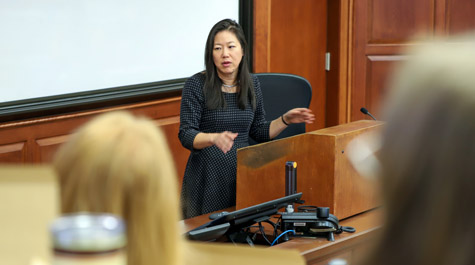Colleen Chien Presents Annual Mervis Lecture in Intellectual Property
On March 30, Colleen Chien, Professor of Law of Santa Clara University School of Law, presented the 2021-22 Stanley H. Mervis Lecture in Intellectual Property at William & Mary Law School. The event was held both in person and live-streamed.
Chien’s presentation, titled “Inequalities of Innovation,” took the audience through an examination of the relationship between inequality, innovation and patents, showing the complex ways that patents and innovation can either intensify or alleviate different types of inequality.
Chien described different types of inequality that are relevant to innovation. She suggested that, first, some level of economic inequality may actually encourage innovation. This is because new technologies underwritten by profits can benefit people of every income level, even if they initially benefit the most advantaged more than the least.
The second type of inequality of innovation that Chien identified is inequality of opportunity to innovate. Here, she suggested that there are opportunities to decrease inequality by increasing “invention capital,” or finding ways to make role models, networks, know-how and trust more accessible.
The third type of inequality, inequality of access to innovation, is typified by situations where important innovation is inaccessible because of high price.
Chien proposed a number of initiatives that would increase equality through the patent system. The first proposal aims to expand invention capital through the creation of an Office of Small Inventors Advocate, with the aim of leveling the playing field among applicants. Another proposal is the creation of an Independent Office of Public Interest and Partnerships, aimed at increasing access to innovation. Last, Chien discussed the need for equity metrics to boost patent entry and success.
Chien is internationally known for her empirical scholarship on the patent system, including her work on patent assertion entities, patent quality, and policy pilots. She is among the top 20-cited intellectual property and cyberlaw scholars in the U.S. and has received prestigious awards including the American Law Institute’s Early Career Medal, the Intellectual Property Vanguard Award, and the Eric Yamamoto Emerging Scholar Award.
A regular expert speaker before Congress and executive agencies, Chien served on the Biden-Harris Transition Commerce Department Agency Review Team with primary responsibility for the Patent and Trademark Office. From 2013 to 2015 she served as Senior Advisor, Intellectual Property and Innovation to the U.S. Chief Technology Officer in the White House Office of Science and Technology Policy.
Prior to entering academia, Chien worked as an investigative journalist (while a Fulbright Scholar), strategy consultant, and patent lawyer registered by the USPTO, as an associate, then special counsel at Fenwick & West LLP in San Francisco prosecuting patents. She graduated from Stanford University with honors and degrees in Engineering and Science, Technology, and Society, and earned her J.D. from Berkeley School of Law, University of California, Berkeley.
Chien is the founder of the Paper Prisons Initiative (www.paperprisons.org) which uses research and data to expand opportunities for people with criminal records.
About the Stanley H. Mervis Lecture
The Stanley H. Mervis Lecture in Intellectual Property is a lecture series in memory of Stanley Mervis, an alumnus of the William & Mary Law School Class of 1950. Mervis was an avid patent and intellectual property attorney and spent most of his career as patent counsel for the Polaroid Corporation.
The inaugural Mervis Lecture was held at William & Mary Law School in 2006. Recent legal experts who have given Mervis Lectures include: Professor Mark A. Lemley, Stanford Program in Law, Science and Technology (2016); The Honorable Pierre N. Leval, U.S. Court of Appeals for the Second Circuit (2018); Paul Grewal, Vice President and Deputy General Counsel of Facebook (2019); and Judge Kathleen M. O’Malley (ret.), U.S. Court of Appeals for the Federal Circuit (2020).
About William & Mary Law School
Thomas Jefferson founded William & Mary Law School in 1779 to train leaders for the new nation. Now in its third century, America’s first law school continues its historic mission of educating citizen lawyers who are prepared both to lead and to serve.
